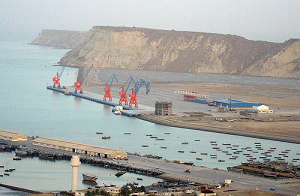The China-Pakistan Economic Corridor Between Hope and Fear
By Mushtaq A. Kaw
April 26, 2017, the CACI Analyst
In December 2016, China’s Ambassador to Pakistan, Zhao Lijian, stated that “CPEC is working well” with the support of the Pakistani people, notwithstanding certain opposition. The statement is characteristic of China’s and Pakistan’s praise for the China-Pakistan Economic Corridor (CPEC) as a game changer for their respective economies and regional connectivity. Yet in reality, the project faces a variety of intricate economic challenges as well as security threats. Its success will therefore depend upon an inclusive, balanced and sustained China-Pakistan approach towards the forces hostile to the project. Even then, the project will have various geopolitical, geo-economic and geo-strategic implications for the region and the world.

Japan's and China's different functions in Asia
By Najia Badykova
January 15th, 2016, The CACI Analyst
On November 24, a Japanese delegation met in Ashgabat with the deputy foreign ministers of five Central Asian states in a “Central Asia plus Japan” format to discuss regional security, sustainable development, trade and investment, as well as regional cooperation and disaster prevention. In October, Japanese Prime Minister Shinzo Abe visited all of the Central Asian states as a part of Tokyo’s efforts to strengthen economic relations with the resource-rich region, holding talks with Central Asian leaders mainly devoted to the energy issue. This is an important shift in Japanese foreign policy. Its long-time competitor China is already established in Central Asia and Tokyo’s recent initiatives have been described as part of the growing competition between China and Japan.
Kazakhstan's revival of the Silk Road Initiative: the challenges ahead
By Rafis Abazov
October 8th, 2015, The CACI Analyst
During his recent visit to China, Kazakhstan’s President Nursultan Nazarbayev signed a series of trade agreements and Memorandums of Understanding (MOUs) on 48 projects valued at about US$ 30 billion. The Minister of Economic Affairs, Yerbolat Dosayev, has called the Chinese market one of the “main markets for Kazakhstan.” The Kazakh government also reiterated its support for the Beijing-instigated “Silk Road Economic Belt (SREB)” initiative and agreed to continue working on several large infrastructure projects. But opinions of Kazakh experts on the SREB are divided. Some believe China’s financial backing will strengthen trade and lead to economic growth, but others are skeptical, claiming it would conflict with the U.S.´s “New Silk Road” initiative.





